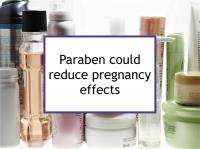While pregnancy temporarily elevates a woman's risk of breast cancer, this risk normally subsides after giving birth. At the end of lactation, the breast returns to a resting state. This involves changes that permanently alter the breast in ways that eventually reduce breast cancer risk (i.e., after approximately three years).
However, this pregnancy-associated risk reduction does not always take place. For example, it may never take place for women who are obese at the time of pregnancy, or whose pregnancy lasts for less than 34 weeks, or who do not breastfeed. Now a new study has reported that exposure to the paraben propylparaben during pregnancy can also interfere with this process, possibly neutralizing the potentially advantageous long-term effects of pregnancy on breast cancer risk.
Parabens linked to increased breast cancer risk
Parabens (alkyl esters of p‐hydroxybenzoic acid) are widely used as preservatives in cosmetics and personal care products, as well as in pharmaceuticals and processed food. They extend shelf life by preventing microbial and fungal growth. Parabens have long been suspected of contributing to breast cancer risk since they are xenoestrogens, man-made compounds that bind to and activate estrogen receptors.
Parabens are absorbed into circulation through the skin. In other words, parabens can penetrate human skin intact and be absorbed systemically. The most common parabens used in consumer products are methylparaben, ethylparaben, propylparaben, butylparaben and isobutylparaben. Despite some published claims that parabens have short half lives, they appear to be fairly stable molecules, which enables them to accumulate in breast tissue. Parabens were found in 99% of breast tissue samples of breast cancer patients in one study.
Affected industry groups have vigorously defended the use of parabens in their products, for example, by maintaining that parabens are 10,000 to 100,000 times less active than phytoestrogens consumed in plant foods or estrogens produced in the human body. However, parabens at concentrations found in breast cancer patients have been shown to be capable of initiating breast cancer development.
In fact, parabens found in breast tissue often are also at high enough levels to stimulate ER+/PR+ breast cancer cell proliferation and increase migratory activity. In addition, parabens can interfere with the treatment effects of tamoxifen in estrogen receptor positive (ER+) breast cancer cells.
Latest research finds propylparaben alters pregnancy effects
The study referenced above was designed to investigate whether propylparaben can alter the protective effects of pregnancy against breast cancer development. The mammary gland is hormone sensitive, making it susceptible to endocrine disrupting chemicals during the period around pregnancy and involution (when the mammary gland undergoes extensive cell death and remodeling as it returns to the non-lactating state).
To conduct the study, the authors assessed the effects of various levels of daily propylparaben exposure (0, 20, 100, or 10,000 µg/kg) in pregnant BALB/c mice. Unexposed females who had never been pregnant were also evaluated for comparison. Mice mammary glands were removed five weeks after involution. The authors then identified and evaluated changes in hormone receptor expression, gene expression, cell morphology (structure, form and size), and number of immune cells associated with propylparaben exposure.
Propylparaben was found to reduce several parameters of mammary gland morphology. Propylparaben also was shown to increase proliferation (but not the number of stem cells), and induce modest changes in ERα-mediated gene expression. In addition, propylparaben exposure resulted in changes in the number of several types of immune cell in the mouse mammary gland. The authors conclude that propylparaben (at levels corresponding to potential human exposures) can interfere with the effects of pregnancy on the mouse mammary gland and cause long-term alterations in mammary gland structure. More studies are needed to determine whether propylparaben exposure can extinguish the protective effects of pregnancy on mammary cancer development, according to the authors.
For more information on how young women can reduce their breast cancer risk, please see our article on the teenage years and young adulthood.
